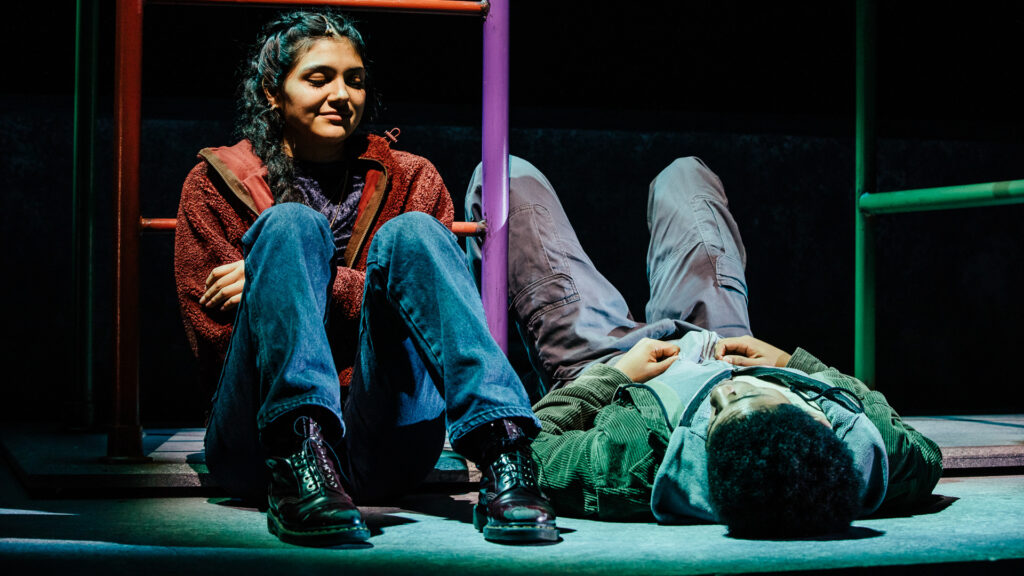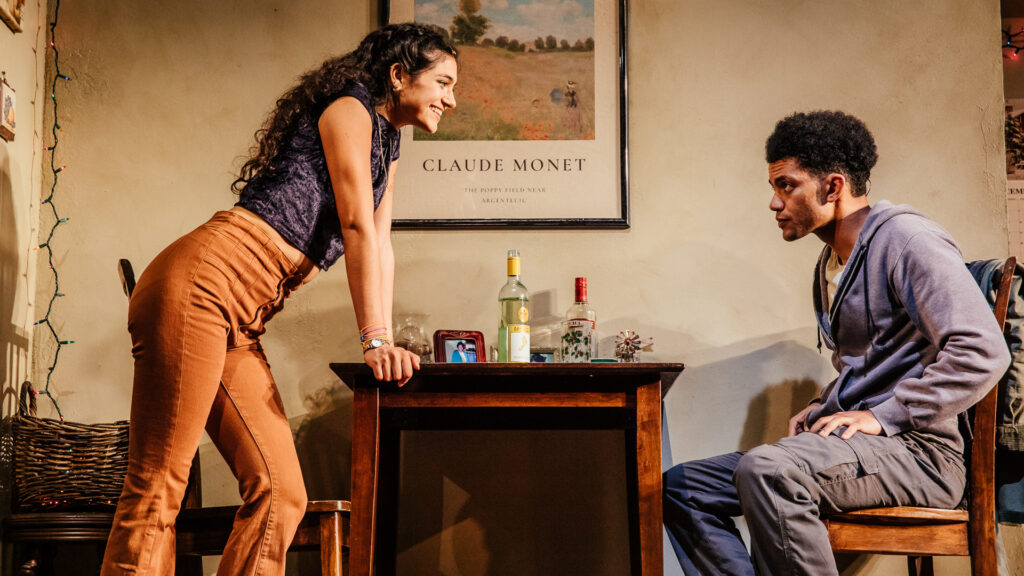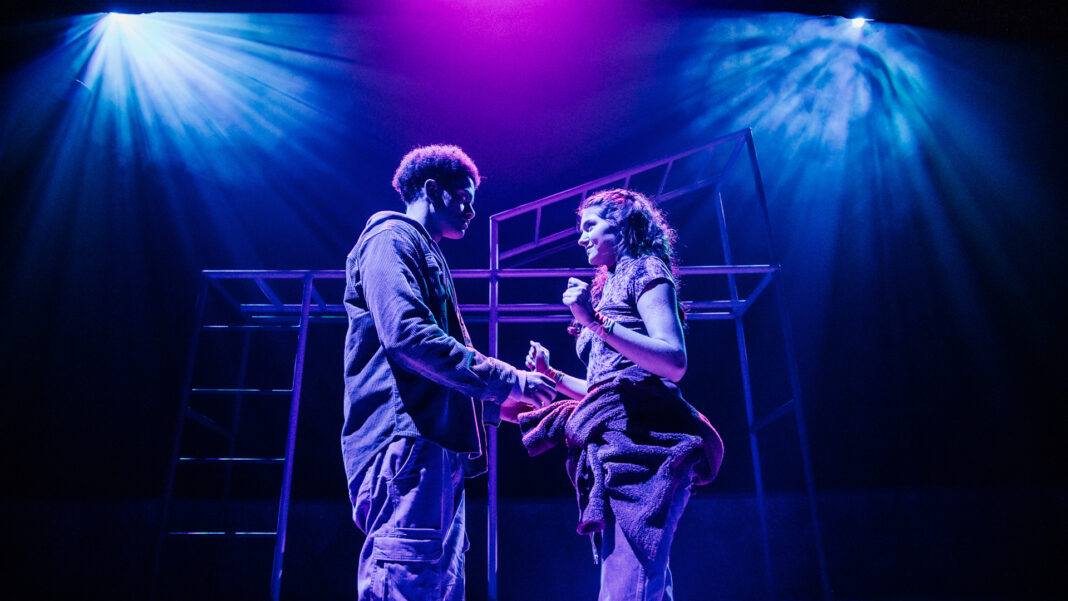“There’s a real sense that what Martyna set out to do and what these characters do is tell you the truth.” The Martyna is Pulitzer Prize-winning playwright Martyna Majok. The characters are those found in her play Sanctuary City which just opened at the Pasadena Playhouse. And the man saying this is the production’s director Zi Alikhan.

Alikhan is a very much in-demand director these days. He has directed several plays that opened in the last six months. Amongst them were Snow in Midsummer at Classic Stage Company and On That Day in Amsterdam which just closed at Primary Stages (both in New York.) A month after Sanctuary City‘s opening, Geva Theatre Center in Rochester will open a production of Somewhere by Matthew López (Tony Award-winner for The Inheritance – now in previews at the Geffen Playhouse in Los Angeles.)
Sanctuary City is a play he’s loved since he first saw a production in 2021.
“I actually got to see the original production of this play at New York Theatre Workshop and it was one of the most harrowing and precise and gorgeous nights in the theater I’ve ever had.” He knew from that moment that this was a play he’d love to have the opportunity to direct. But that wasn’t something he necessarily expected to happen.
“It is so unique to read a contemporary American play that really revolves around the lives of three young people of color,” Alikhan said last week during a Zoom conversation. “And it’s so unique for a theater with the visibility of the Playhouse to then program a play that does that. And for an artistic leader like Danny Feldman to commit to a process led by another young person of color.”
In Majok’s play two characters, B (Miles Fowler) and G (Ana Nicolle Chavez), are navigating their status as undocumented immigrants attending high school. When G is naturalized the two try to figure out a way for B to also receive legal status. With the introduction of a third character, Henry (Kanoa Goo), things don’t necessarily work out as planned.
“What’s so unbelievably fascinating about this play is that these characters essentially don’t have time for sentimentality,” he said of the play. “The circumstances under which B, G and Henry’s lives exist are so entrenched in their lives.”
Alikhan goes on to describe how he understands Majok’s concepts of these characters.
“What I think Martyna is ultimately doing in creating a play like that is [it] forces audience members to learn. There’s nothing comfortable. There’s nothing being spoon-fed to audiences in the text of this play. It is really an opportunity for, I think, the average audience member to go and see and hear and partake in and absorb life that is so different from their own or for those who resonate with the lives of the people represented in this play.”
The son of two immigrants, Alikhan has a way into the play that offers both a unique perspective and a shared one.
“I think something that is extremely true of my experience growing up in this country is definitely feeling on the outside of a system. It’s the first play that I’ve directed that’s kind of both a period piece and very of my era. I lived this high school experience right around the same time they did. My experience of being a young, Brown person in America, especially a young Brown person that grew up Muslim in a Muslim family right in the aftermath of 9/11. That meant how scary that could be.”
The difference between Alikhan’s upbringing and those of the characters in Sanctuary City is that he never had to live with the fear of being deported.

“What feels fundamentally different is that my experience is not one of undocumented immigration. So it’s been a really important part of my journey with this play to, as authentically as I can, understand the lives of undocumented Americans and understand the very specific corners of life that undocumented Americans both occupy and are kind of forced into by virtue of the systems and structures of this country.”
Immigration remains a hot-button topic in the United States. Just look at very recent stories about immigrants being shipped to New York, Martha’s Vineyard, Washington, D.C. and other locations. Alikhan was a bit surprised when asked if he considered how those who are unsympathetic to the plight of immigrants might respond to Sanctuary City and how that might impact his cast.
“It’s funny. I’ve never really thought to talk with the cast about that. One of the most educational experiences of my career so far has been touring with Hamilton [as Resident Director] and taking a project that is primarily cast with people of color around the country and telling that story in so many different markets that were equally ready and not ready to experience that play on stage. It kind of taught me that the best that we can do is to present the work that we’ve done and be authentic and honest with that work and then allow people space for the educational experience that is seeing that thing.”
Alikhan added, “What I do want to say is it’s just as much for them as it is for people with whom the play does deeply resonate. Whether it immediately resonates with you or not, that might teach you something about your own way of life and how you walk through the world.”
There is an additional issue that comes up in the second half of Sanctuary City that is also topical. Alikhan agrees that we should leave a sense of discovery for audience members, but acknowledges current events have given extra weight to that component of Majok’s play that it didn’t have when he saw the play in New York.
“As an audience member in 2021 I knew something that these characters don’t know about what’s going to happen in the world and how this circumstance will be fundamentally different just a few years in the future. I wish I could transport time and space and tell them that. I found that to be such a fascinating experience.
“And then as we were getting ready to do this production Roe was overturned. We read Clarence Thomas’ opinion on Roe where other fundamental rights were called into question. It was a time, especially working on this play, where I thought to myself, oh my God, the theater is a living, breathing animal. Because the experience that I had watching this play eight months ago is now fundamentally different than the experience our audiences are going to have watching this play three months from now.”
From the outside looking in at Alikhan’s career, it seems as though it is the most deeply-felt plays that pique his curiosity and get his attention. He’s directed plays by Award-winning writers Lucas Hnath (Red Speedo) and Annie Baker (The Flick). Adding Majok to the list just makes a certain sense.

“What’s so fascinating to me about them is how they really put a magnifying glass again on people who really rarely get to be at the center of a story. Especially as a young, queer, Brown kid, it took so long for me to see myself represented in any kind of media. So I think something that really draws me to a project is being able to, first and foremost, say what is the impact that the story’s going to have on the community that surrounds it? What kind of story is uplifting that maybe it’s never been told before? How can I be in conversation with both the creative team and the writer to make a version of it that feels both authentic and uplifting to those people in that community?
“Something that Martyna does that is so that is so gorgeous and effortless is she lifts the stories of these three characters to the highest of value that you can in a play. She centers the story around the lived experiences of these three people whose lived experiences are very different than many of our audience members may be. [It’s] the playwright saying, ‘I value the lives of these characters and thus I value the lives of the people.’ These characters reflect myself and my team. We value first and foremost the lived experiences of the actual people that these three characters reflect. We value the contribution of every single person that lives in this country. We value the stories. We value you and want to uplift the histories, the triumphs, the joys, the grief. Through this play I really hope that we are able to honor and inform the lives of Americans who rarely get to occupy the space of being on stage and of having their stories told.”
Sanctuary City runs at the Pasadena Playhouse through October 9th.
Main Photo: Miles Fowler and Ana Nicolle Chavez in Sanctuary City (Photo by Jeff Lorch/Courtesy Pasadena Playhouse)










